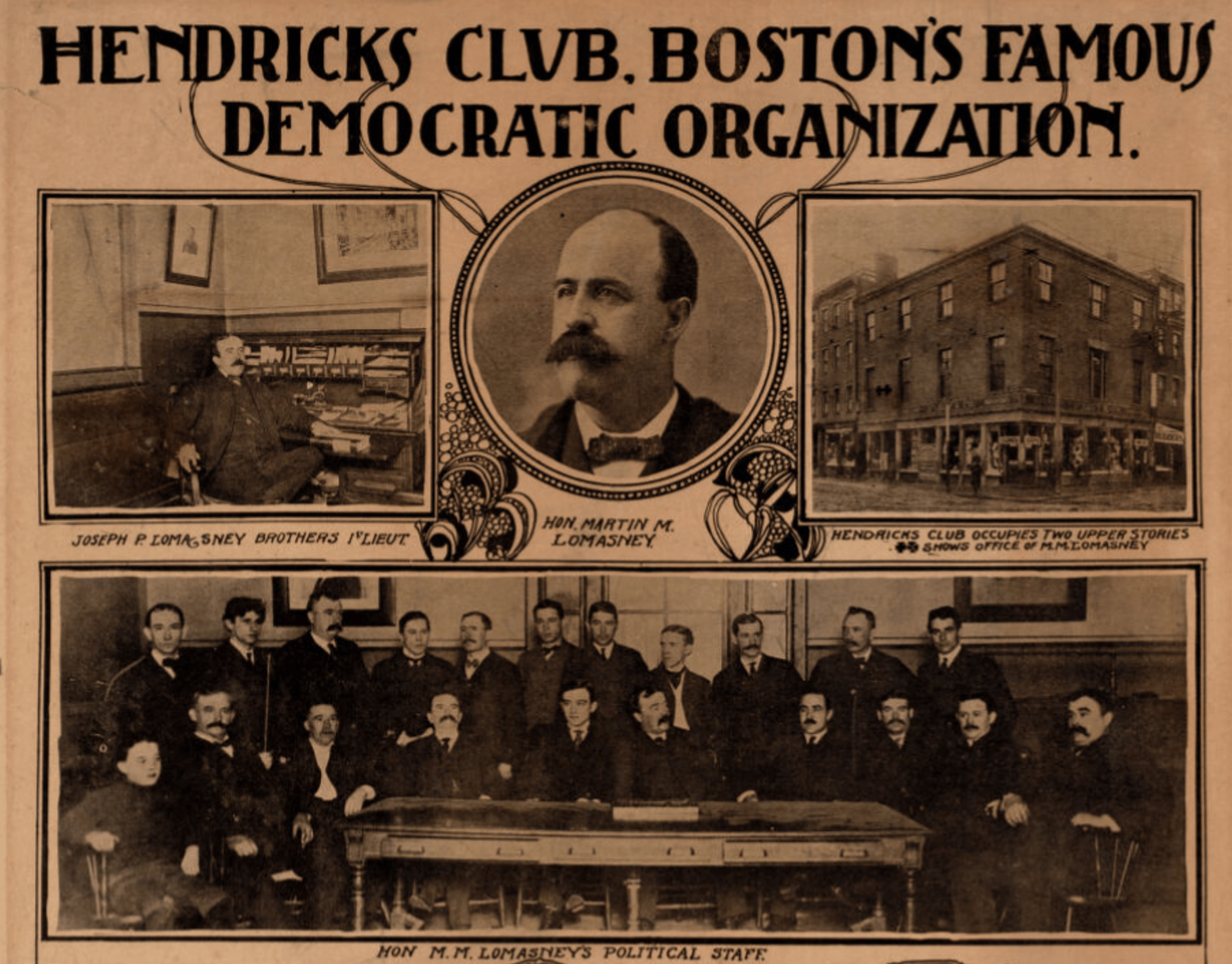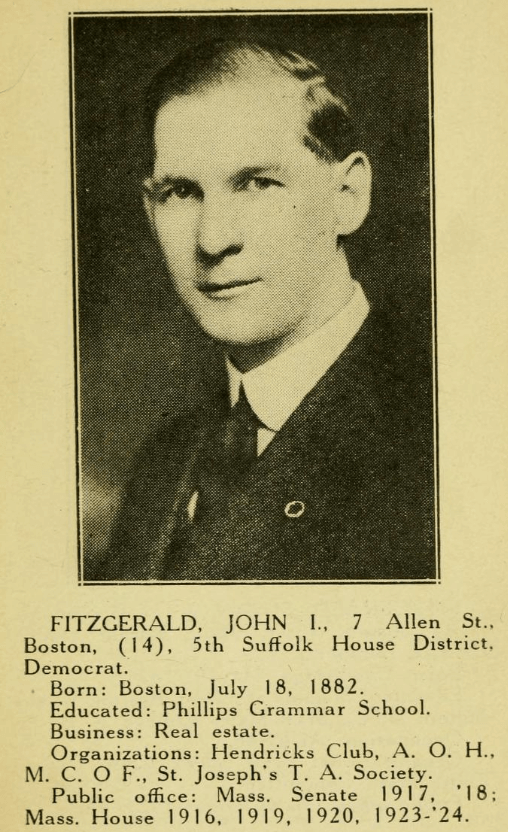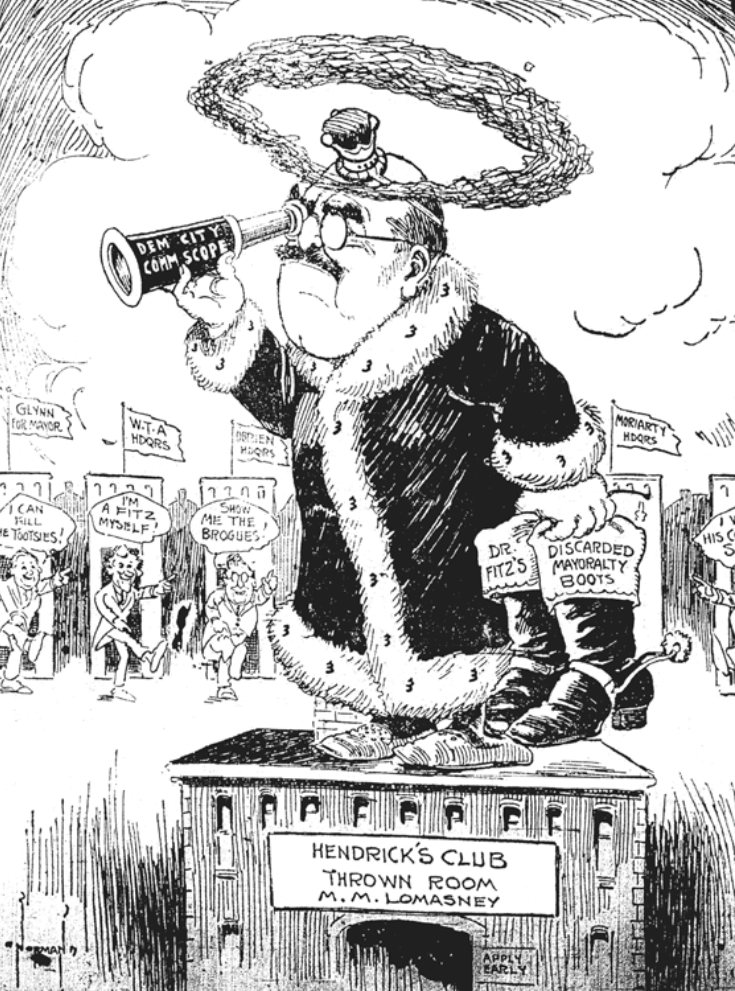Martin Lomasney & John Ignatius Fitzgerald: A West End Political Relationship
After Martin Lomasney (1859-1933), the legendary “Mahatma of Boston,” made John Ignatius Fitzgerald (1882-1966) a precinct captain at age 18, Fitzgerald became Lomasney’s right-hand man. Their political relationship provides a window into the inner workings of early-twentieth-century ward politics in the West End.
From his command post at the Hendricks Club, West End Ward Boss Martin M. Lomasney controlled elections, doled out patronage jobs, and fulfilled the needs of people in his district for over 40 years. He stayed in power by changing with the times. When Italian, Jewish, and Black communities displaced Irish immigrants in the West End, Lomasney helped them enter politics and find jobs. Lomasney supported Progressives’ reforms for the popular election of US senators and direct primaries. As a legislator, he voted for trade unions; housing for the poor; wage and hours laws for women, children, and public employees; two-week paid vacations, 8-hour days, and minimum wages for state employees; tenure and higher salaries for school teachers; and one day’s rest each week for hotel and restaurant workers. Lomasney drew the line, however, at women’s suffrage: “You can’t trust these women,” he once remarked, “they are apt to blab everything they know.”
Life-long West End resident John I. Fitzgerald began his political career by delivering newspapers to Lomasney. After Lomasney made him a precinct captain at age 18, Fitzgerald became Lomasney’s right-hand man. Once, he unwittingly revealed details about his work to a Lomasney biographer. When asked if voting in Ward Eight was ever dishonest, Fitzgerald replied: “No. The Ward [is] always too closely watched. Ballot boxes are never stuffed unless it’s absolutely necessary.” Lomasney effectively selected who would represent Ward Eight (the West End), and in 1916, he selected Fitzgerald. This launched Fitzgerald into state politics: he served in the State Senate in 1917-1918, and in the House in 1919-1920 and 1923-1927.
Benjamin Loring Young (1885–1964), a Massachusetts politician, described Lomasney’s mode of operation, and Fitzgerald’s role in it, during a 1961 speech to the Massachusetts Historical Society:
Martin Lomasney was the only ward leader or boss who could not only carry his own ward himself when a candidate but could also carry the ward for any other candidates who met his approval. He had a club on Staniford Street called the Hendricks Club, and on the Saturday or Sunday night preceding primary and election days he would have his leaders and followers meet at that Club. He would strip for action by taking off his coat, waistcoat, necktie, and collar. He would give orders to his retainers just as a feudal lord might have given orders to the squires and yeomen… No dissenting voice or vote was heard. Anyone who objected would be thrown out. Sample ballots were printed and distributed throughout the several precincts of the ward… He himself, when a member, always had a position on Ways and Means and one of his colleagues was always on Metropolitan Affairs. In the years when Martin was not a member, he usually had his chief lieutenant, John I. Fitzgerald, appointed to Ways and Means.
After Lomasney died in 1933, Fitzgerald had an influential career as a state senator, state representative, city councilor, and fire commissioner. Fitzgerald was once the youngest person to hold the position of acting mayor. A shrewd investor, Fitzgerald brokered real estate in Boston from the 1920s on. From the 1950s on, he managed several busy parking lots near North Station. He died in 1966 in his home in the West End – the neighborhood he spent his entire life in.
Article by Nancy Dennis, edited by Grace Clipson.
Sources: Boston Globe, “Fitzgerald Out of Mayor Race: Withdrawal Leaves Eight—Hearings Open Today,” Oct 20, 1937; Boston Globe, “J. L. Fitzgerald Rites Thronged in West End,” Dec 18, 1966; Boston Globe, “John I. Fitzgerald, Veteran in City, State Politics,” Oct 25, 1948; Boston Globe, “Lomasney Left $300,000, But Never Had a Checkbook: Mahatma’s Death Means Passing from Political Scene of Last of Old-Time Bosses – Anecdotes of a Colorful Personality,” Aug 20, 1933; Boston Globe, “Lomasney Near Death’s Door: Veteran Politician Has Bronchial Pneumonia, Not Well for Some Months but Crisis Came Quickly,” Aug 12, 1933; Boston Globe, “Lomasney Shrewd, Aggressive Fighter: No Neutrals in Politics as He Played Game- Vindictive, But Loyal to Friends and Kin,” Aug 13, 1933; Boston Globe, “Obituaries: John I. Fitzgerald Services Saturday,” Dec 16, 1966; John D. Buenker, “The Mahatma and Progressive Reform: Martin Lomasney as Lawmaker, 1911-1917,” The New England Quarterly 44, no. 3 (1971): 397–419; John Allen Hague, “The Massachusetts Constitutional Convention: 1917-1919. A Study of Dogmatism in an Age of Transition,” The New England Quarterly 27, no. 2 (1954): 147–67; MIT, “The West End Through Time: From Farmland to Subway Suburb”; New York Times, “A Fine Old Bostonian,” Aug 15, 1933; New York Times, “Martin Lomasney Dead in Boston, 73: For 40 Years a Dominating Political Force, He Began as a Bootblack. Had been a Foe of Curley. Held Balance of Power in most of City’s Pre-Election Contests – Was Friend of Lodge,” Aug 13, 1933; Henry L. Shattuck, “Martin Lomasney in the Constitutional Convention of 1917-1919,” Proceedings of the Massachusetts Historical Society 71 (1953): 299–310; Albert Van Nostrand, “The Lomasney Legend,” The New England Quarterly 21, no. 4 (1948): 435–58; Loring B. Young, “Martin Lomasney as I Knew Him,” Proceedings of the Massachusetts Historical Society 75 (1963): 52–65.










